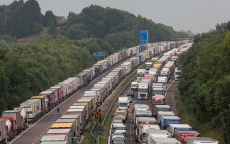
Several weeks ago, I found myself on a coach in Brussels, on the way back from my trip to Cologne when we were told that we could not return to the UK that night and were going to have to get off the coach and wait outside the train station for the whole night before we could get another coach in the morning. The reason for this was that all ferries across the English Channel were cancelled, due to industrial strikes of workers at the port. Becoming interested in the cause of our adventure, I decided to investigate further. These strikes have caused a large amount of disruption over the past month, for those using the ferries directly, as well as others, such as the coach companies like the one I was using. So what exactly is the problem and how has it been dealt with?
The strikes began in response to the sale of MyFerryLink, a company that ferries between Dover and Calais, since this business exchange could mean the potential loss of 600 jobs. The strike was mainly organised by members of the Maritime Nord union, alongside other workers at the ports. The worries of the strikes may have been somewhat expected, since in the region of France where Calais is found, unemployment rates are at 13%, one of the highest in France, compared with the 10% of unemployment seen nationally. MyFerryLink was sold mainly because the current owners, ’Eurotunnel’, who also manage train transport across the channel, were told that their ownership of MyFerryLink broke various business competition rules. This meant they were forced to sell to DFDS, a Danish company in July this year.
Not only the ferries have been hit by the strike action, but also airlines between the two countries as workers set up blockades across important roads, causing severe delays in transport across the whole region. The Eurotunnel, which was acting as the best alternative route across the channel for tourists was also targeted, with many protesters standing on the railway tracks and preventing the train from moving.
For several weeks tourists were told that it may be sensible to abandon plans for travel, particularly in the case of day trips across the channel, since though it may be possible to get them into France, it may be impossible for them to travel back later that day, leaving them stranded in France. While the three main ferry companies, DFDS, MyFerryLink and P&O Ferries, would usually have had the use of 9 different berths at the docks, the strikes have meant that all 3 companies have had to share the use of just 1, meaning they were forced to dramatically cut back from their usual 40 journeys a day across the channel.
Other companies that were affected by the problems included Kent Police who were forced to put into action ‘Operation Stack’ whereby parts of the M20 were split off and used to queue lorries awaiting transport across the channel, so that there was less disturbance to the rest of the Kent road networks. This operation was recently finished and many lorry drivers contacted the police service using social media to thank them for dealing with a tough situation so quickly and efficiently. On top of this the immigration services at the ports were thrown into chaos by the striking action, since with so many lorries queuing up at the ports to await transport, it became far easier for people wanting to travel into the country illegally to quickly stow away inside the backs of lorries, meaning that security has had to be tightened on both sides of the channel.
While the main strikes have now subsided, the events of the past few months have reminded us to always be prepared for a sudden upheaval like this one as we don’t know what could upset the system next, and we should thank all of the major companies that were affected by the strikes, because of their hard work in ensuring that normal business continued as smoothly as possible.
Image from: http://i.telegraph.co.uk/multimedia/archive/03362/calais-m_3362921b.jpg

0 Comment:
Be the first one to comment on this article.